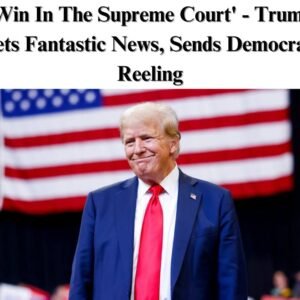CNN’s senior legal analyst, Elie Honig, has strongly criticized a federal judge for making what he called “inappropriate” and politically charged remarks about former President Donald Trump. The judge’s comments came as part of a ruling that overturned Trump’s attempt to fire the chair of the National Labor Relations Board (NLRB). This case has sparked debate about judicial conduct, executive power, and political bias in legal rulings.
The controversy began when Trump fired the NLRB chair through a brief email after returning to the White House. The decision led to a lawsuit, with Hampton Dellinger, a special counsel overseeing whistleblower cases, challenging his removal. The case soon became a broader discussion on the limits of presidential authority over independent agencies.
U.S. District Judge Amy Berman Jackson, appointed by Barack Obama, temporarily reinstated Dellinger while the case was under review. In her ruling, she stated, “An American president is not a king,” arguing that Trump’s power to remove federal officers was not absolute. These remarks quickly gained attention for their perceived political tone.
Honig criticized the judge’s statements, arguing that while courts can review presidential actions, using political rhetoric undermines judicial credibility. He pointed out that Trump’s legal argument about executive authority was not unusual and should not have been misrepresented as dictatorial behavior.
The case progressed to the D.C. Court of Appeals, which unanimously overturned the district court’s decision. This allowed Trump’s firing of the NLRB chair to proceed while the case remained under legal review. The appellate court emphasized that executive removal powers should be interpreted within constitutional limits.
During a CNN segment, Honig reiterated his stance that judicial rulings should focus on legal reasoning rather than political commentary. He warned that when judges use language that aligns with partisan narratives, it risks eroding public trust in the judiciary. He also predicted that the case might reach the Supreme Court.
The broader legal debate centers on whether the president’s removal power is absolute or subject to congressional limits. Legal scholars remain divided, with some arguing that restrictions are necessary for checks and balances, while others believe they hinder executive efficiency. The Supreme Court may eventually set a definitive precedent.
Political leaders have responded sharply to the case. Republicans argue that Trump’s actions were a necessary step toward government efficiency, while Democrats worry that unchecked presidential removals could weaken independent agencies. The debate has fueled discussions on the balance of power within the federal government.
Media coverage and social media have amplified the controversy. News networks have debated the judge’s remarks, while online discussions reflect both support for Trump’s legal stance and concerns about judicial bias. The issue has sparked broader conversations about the role of courts in political disputes.
As the case continues, its outcome could reshape executive authority and the role of the judiciary. Whether through a Supreme Court ruling, legislative reforms, or continued legal challenges, the battle over presidential removal powers is far from over. The decision will have lasting implications for the future of American governance.
